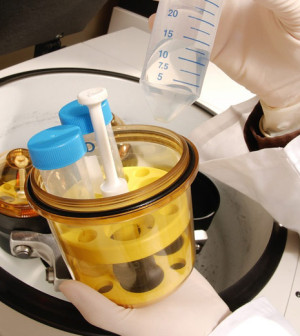- Could Your Grocery Store Meat Be Causing Recurring UTIs?
- Are You Making This Expensive Thermostat Error This Winter?
- Recognizing the Signs of Hypothyroidism
- 10 Strategies to Overcome Insomnia
- Could Artificial Sweeteners Be Aging the Brain Faster?
- Techniques for Soothing Your Nervous System
- Does the Water in Your House Smell Funny? Here’s Why
- Can a Daily Dose of Apple Cider Vinegar Actually Aid Weight Loss?
- 6 Health Beverages That Can Actually Spike Your Blood Sugar
- Treatment Options for Social Anxiety Disorder
Cancer Advances Demand Continual Funding, Specialists Say

Sufficient and sustained funding for cancer research should be a global priority, European and American cancer organizations said at the start of an international oncology conference in Germany on Tuesday.
Significant progress has been made in the understanding of how cancer develops. But, consistent research funding is needed to take advantage of these advances to improve cancer survival rates, according to specialists from two of the cancer organizations sponsoring the Munich meeting.
“There has never been a more exciting time in cancer research,” said Dr. Denis Lacombe, director general of the European Organisation for Research and Treatment of Cancer (EORTC).
“With the surge in molecular biology developments and a growing consideration for cost-benefit balance from a public health perspective, there is an increasing need to invest in cancer research and improved international partnerships to validate new targets and technologies,” Lacombe said.
The ultimate purpose is “ensuring they provide real-world benefits to patients,” he said in a conference news release.
This era of scientific discovery holds enormous promise for new advances in cancer treatment and prevention that could save lives around the world, added Dr. Margaret Foti, chief executive officer of the American Association for Cancer Research (AACR).
“Failure to capitalize upon these scientific opportunities is simply not an option. Now is the time for policymakers worldwide to prioritize and invest in lifesaving cancer research,” Foti said.
Worldwide, more than 15 million new cancer cases were diagnosed in 2015, and more than 8 million cancer deaths were reported. Without improvements, those grim numbers could rise dramatically in coming decades, these cancer experts said.
In the United States, the cancer death rate fell 1.5 percent a year between 2003 and 2012. This led to a dramatic increase in cancer survivors — from about 10 million to 13.7 million — during that time.
Talking about the potential for promising new treatments, Lacombe said nearly 600 cancer drugs were in the late stages of development last year.
“New treatments account for 83 percent of improvements in survival, and 80 percent of cancer drugs in the pipeline are first-in-class medicines,” Lacombe said.
“However, new oncology drugs still have the lowest rate of success, as these technologies require better alignment with current molecular and technical knowledge,” he added.
More resources need to be dedicated to “building partnerships and infrastructures to develop these approaches,” Lacombe added.
Foti agreed.
In the Unite States, sufficient federal government funding is “vital if we are to accelerate the pace of progress against cancer for the benefit of patients and their loved ones everywhere,” Foti said.
The conference is sponsored by the AACR, the EORTC and the U.S. National Cancer Institute.
More information
The American Academy of Family Physicians has more on cancer.
Source: HealthDay
Copyright © 2026 HealthDay. All rights reserved.










